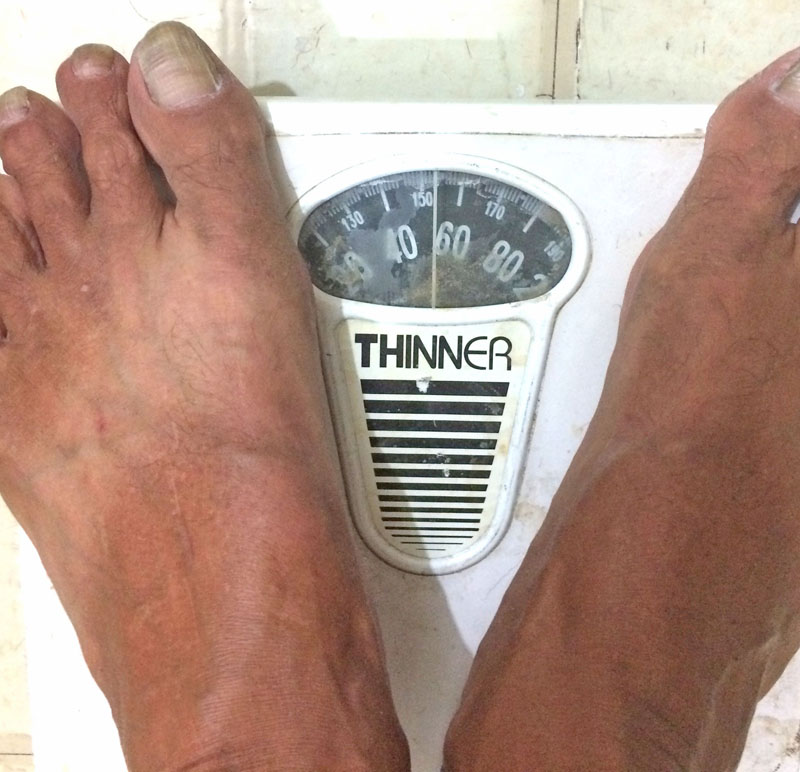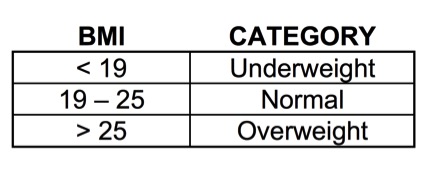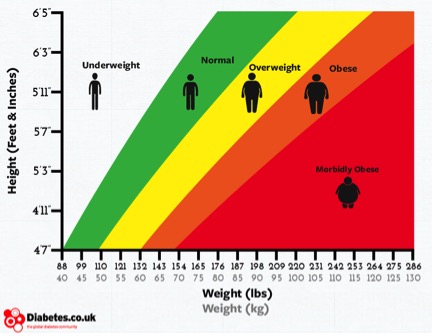A little over a year ago I wrote that we should shit-can backpacking base weight categories. I also presented the argument that total pack weight is the most important thing and base weight was unimportant.
Actually base weight is important, in fact it is very important.
BASEWEIGHT REDEFINED
I am not referring to the weight of your gear, but your weight. You body weight.
Crisis in America
In the United States 68.5% of all adults are overweight or obese. Let me reinforce that statement.
68.5% OF ALL ADULTS ARE OVERWEIGHT OR OBESE
You may ask the question, “Am I overweight? How do I know?”
Body Mass Index
Body Mass Index (BMI) is a measure of comparative size based on the height and weight of an individual.
Most people just look at a chart on use an online calculator to determine the numeric value of their own BMI. Here are formulas if you wan to calculate it your self.


Or you can use a look-up chart.
BMI isn’t perfect. But it is the quickest and easiest way to see your weight is acceptable. If you have low body fat and lots of muscle, the BMI chart may not be applicable — do your research and talk to your doctor. But for most people the BMI is a good reference tool. Different organizations use different BMI ranges to determine BMI categories. Here are the most common BMI categories:
Averages and other math
The average male in the US is 5’ 10” tall. The range for a normal weight of this height would be somewhere between 135 – 174 lb.. That is quite a generous range at 39 lb.. A nice average weight would be around 153 lb., which would score a 22.0 on the BMI scale.
However, if you are an average American male, you weight 194 lb. and are 5’ 10” tall. Your BMI is 27.8, which is overweight.
As you can see in the chart below, there is a narrow band of healthy weight to height ratios.
So what does this have to do with backpacking?
The SUL Nirvana of a 5lb Base Weight
There is always this ongoing debate in the backpacking community about the need to lower backpack base weight. Often you see people try to prove that a certain base weight, lets say 5 lb.. will allow you to travel so many miles two days quicker than let’s say a backpack base weight of 10 lb..
I am using 10 lb.., because that is a fairly easy number for most backpackers to get to. 10 lb.. is the purported Ultra light (UL) category. The so-called Super Ultra light (SUL) category of backpack base weight of 5 lb.. is difficult for most people to attain. So, a 5 lb. reduction in pack base weight from 10 to 5 is significant.
Now remember, we shit-canned UL and SUL last year, so this is just a scientific scenario.
Oh, and they forgot to mention that you will probably spend several hundreds of dollars to drop that 5 lb.. of backpacking gear.
It’s all tripe.
How about this thought process:
Case Study #1
- You are 5’ 10” and weigh 194 lbs. You are the average American male.
- Sorry dude, you are 20 lbs. overweight.
- Don’t replace any gear; just lose 20 lbs. of body weight. Cost = $0.
- You just shed four times as much weight as going from a 10 lb. pack base to a 5 lb. pack base.
Case Study #2
- You get your body weight down to the middle of the healthy, normal range for a 5’10” man.
- That would be around 153 lbs. with a BMI of 22. Very middle of the road healthy.
- OMG!! If you are the average American male you just dropped 41 lbs.
- Over 40 frick’n pounds.
- That is 8 times as much weight as you would drop from an UL hiker to a SUL hiker!!
The real world
But, you might say to me. Backpackers are generally the 21.5 % of Americans that are not overweight or obese.
Nah, poppycock. Almost every backpacker I see on the trail is carrying a dunlap with them. The definition of dunlap is: my belly dun lap over my belt.
Criticism
A while back I wrote that backpackers should mind their own business. They should not evangelize their passion for all things light. That thought process stands.
If so, then who am I to tell someone how much he or she should weigh?
Unlike your pack weight, which doesn’t mean a rat’s ass to me, if you are overweight or obese, you have a huge negative impact on my health care costs. You see, you fat (68.5% of the population) people are driving up health care costs – big time.



